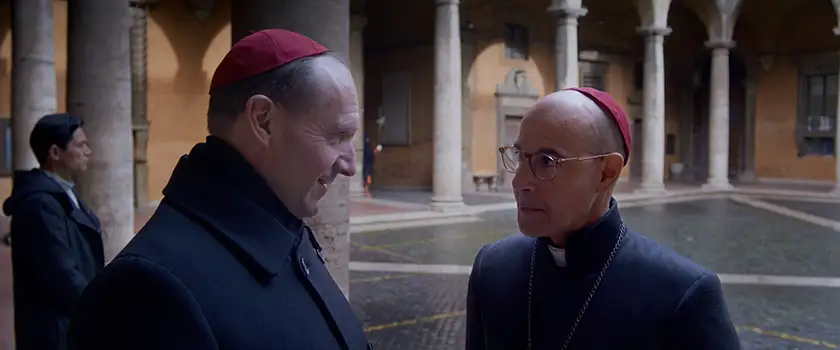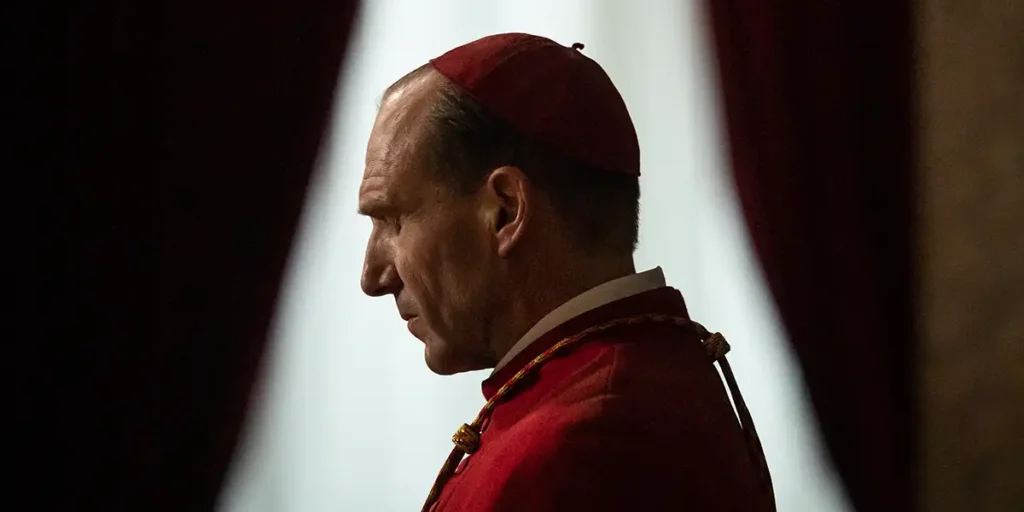Conclave delivers an intricate religious drama full of twists and turns at every step of the papal election.
Director: Edward Berger
Genre: Drama, Thriller
Run Time: 120′
BFI London Film Festival Screening: October 10-16, 2024
U.S. Release Date: October 25, 2024
U.K. Release Date: November 15, 2024
Where to Watch it: In US theaters and UK & Irish cinemas
“The Papacy is a huge burden,” says one of the characters at the beginning of Conclave when discussing who the next Pope should be. As the characters themselves consider this very question during the film, the audience finds themselves involved in a drama of religious background. Just like the main character, we too are kept in the dark about the secrets that most of the members of the Conclave are hiding regarding their past and their ambition. But when this web of secrecy begins to play a significant part in the election for the next Pope, it soon becomes time to uncover it, whether that is for the better or the worse.
Based on a book of the same name written by Robert Harris, Conclave begins with the death of the Pope. When a new Pope has to be elected by the titular Conclave, Cardinal Thomas Lawrence (Ralph Fiennes) has to organise the election in Rome. During the days that follow, multiple cardinals emerge as possible candidates for the papal throne, including his friend Cardinal Aldo Bellini (Stanley Tucci) who represents a liberal way of thinking within the Catholic Church. On the other side, Cardinal Tedesco (Sergio Castellitto) is the conservative faction who would want the next Pope to be Italian and a traditionalist. As Lawrence investigates the secret within the Church itself that the late Pope left behind, other candidates are also considered, such as Cardinal Adeyemi (Lucian Msamati), Cardinal Tremblaw (John Lithgow), the newly appointed Cardinal Benitez (Carlos Diehz), and even Lawrence himself.
It is a poignant analysis of the ambition and corruption running rampant within the Catholic Church and its representatives. While the characters are only mortal men who “serve an ideal,” as one of the protagonists suggests in the film, this criticism goes beyond the singular person but extends to the entire institution at large. As the audience starts doubting every single one of its members, we too – like the late Pope – start losing faith in the Church, and what it stands for. In a film that encourages us to distrust every one of these men, Conclave shows us that corruption is inherent in such an institution, even amongst those that seem most infallible and most moral.
The political side of the elections immediately becomes clear as the two factions that clash against each other represent a liberal side of the Catholic Church which vehemently opposes the more conservative ones, attached to tradition and oppression. Conclave quickly tells us that this is not a matter of faith, as many would like to believe, but rather a matter of politics. Therefore, its characters soon have to act like politicians, whether they like it or not, by forming alliances, finding supporters, and crucially, uncovering information that some of the parties involved would have rathered had remained hidden in the past.

Thriller elements are particularly successful as the film builds its stakes very well: with the election of the new Pope, the entire Church, and its history of progress in the previous years, are at risk. The audience is immediately involved in the matter: although its bureaucratic elements may initially seem boring or repetitive, Conclave will have you at the edge of your seat until its very last frame. This is also a credit to the menacing and sinister soundtrack by Volker Bertelmann that builds the tension even more. From the very first scene, the music lets us understand that something ominous is about to happen as new revelations await the audience with every new act of the film.
The acting is where Conclave shines the brightest. Ralph Fiennes is excellent as the main character, solidifying his place in this year’s Oscar race and as one of the most fascinating and transformative actors of his generation. Stanley Tucci and Sergio Castellitto are also in their respective roles as Bellini and Tedesco, representing two polar opposites within the Catholic Church. The cinematography by Stéphane Fontaine is also particularly impressive.
The setting in Rome and, more specifically, in Vatican City is one of the most fascinating elements of the film, as the latter almost becomes a character in itself. Michelangelo’s “Last Judgment” painted on the altar of the Sistine Chapel where the Conclave is voting for the new Pope is featured multiple times throughout Conclave. The Reinassance fresco stares down at the characters as they make their choices for the future of the Church. As Lawrence often finds himself looking up at the art featured in the Chapel for guidance, we can visually see the past symbolised by these paintings, commissioned by previous Popes that preceded this Conclave, weighing on his shoulders.
The references to real-life matters are also clear enough for the audience to understand its clever commentary on the current state of the Catholic Church. Conclave may be a work of fiction, but its reflection on the institution it analyses so poignantly is very real. The references are also subtle enough to avoid being in the viewers’ faces too much but only become evident for those in the audience who are very familiar with the modern history of the Church. Overall, they almost seem like coincidences more than anything else, if it wasn’t for how many times the characters in the movie resemble the real-life people involved in the latest election of the Pope.
The events of Conclave are fairly similar to what actually happened in the 2013 Conclave: the conservative Italian candidate who many thought would win, an unlikely South-American cardinal who seems to gain the favour of the Conclave, and even the same number of ballots used to elect the new Pope. The film’s ending suggests hope for a better Church, and therefore, a better world as well, but is it one that we also see in real life? It certainly reflects the sentiments many had upon the election of a new Pope in 2013 but, many years later, Conclave cannot answer this question. Instead, the film can show us what the better alternative may look like.
Ultimately, Conclave is everything I could have ever hoped it to be, and more. The film is not only an excellent thriller, but also a very successful reflection on the Catholic Church and the system of corruption that it has come to represent. Despite being a work of fiction, it invites audiences to consider very real questions of faith and reason, while considering what place – if any – the Church with its ancient traditions and use of Latin can occupy in a modern world characterised by multi-faith religions and different languages, only in the film we hear at least four spoken on various occasions.
Conclave is now available to watch on digital and on demand. Read our interview with producer Michael Jackman!

